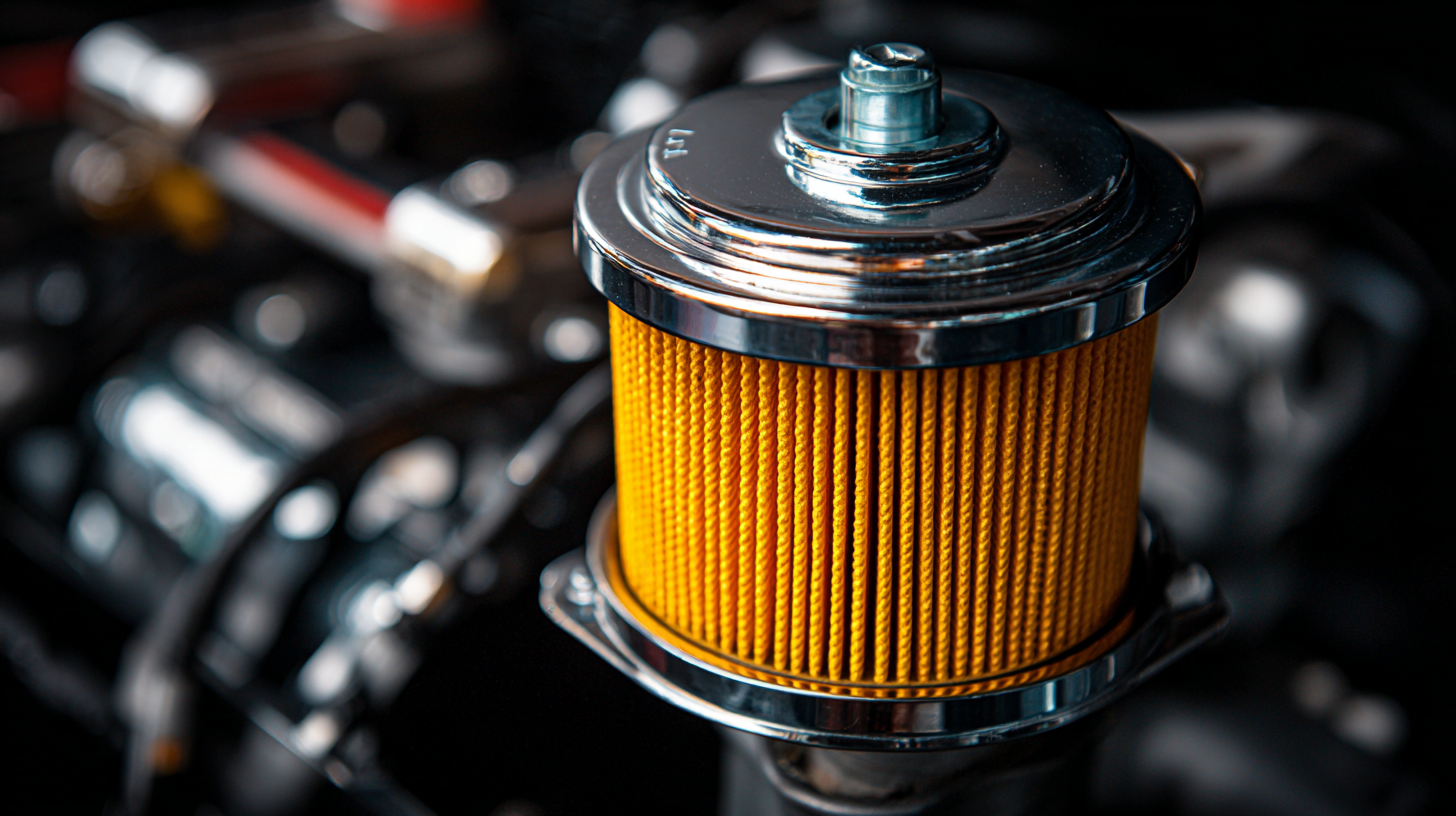 Maintaining a vehicle's engine performance and longevity relies heavily on the often-overlooked component known as the oil filter. According to a study conducted by the American Automobile Association (AAA), nearly 30% of vehicle breakdowns can be attributed to poor maintenance practices, which include neglecting oil filter changes. Oil filters play a crucial role in removing contaminants and impurities from engine oil, ensuring that the engine operates smoothly. The International Council on Clean Transportation (ICCT) reports that proper oil filtration can improve engine efficiency by up to 15%, significantly enhancing fuel economy and reducing harmful emissions. As vehicle manufacturers increasingly emphasize the importance of regular maintenance, understanding the role of the oil filter becomes essential. By recognizing its significance, vehicle owners can make informed decisions that not only extend the life of their vehicle but also contribute to a more sustainable and environmentally friendly driving experience.
Maintaining a vehicle's engine performance and longevity relies heavily on the often-overlooked component known as the oil filter. According to a study conducted by the American Automobile Association (AAA), nearly 30% of vehicle breakdowns can be attributed to poor maintenance practices, which include neglecting oil filter changes. Oil filters play a crucial role in removing contaminants and impurities from engine oil, ensuring that the engine operates smoothly. The International Council on Clean Transportation (ICCT) reports that proper oil filtration can improve engine efficiency by up to 15%, significantly enhancing fuel economy and reducing harmful emissions. As vehicle manufacturers increasingly emphasize the importance of regular maintenance, understanding the role of the oil filter becomes essential. By recognizing its significance, vehicle owners can make informed decisions that not only extend the life of their vehicle but also contribute to a more sustainable and environmentally friendly driving experience.
 Oil filters play a critical role in enhancing both engine performance and longevity. According to the American Petroleum Institute (API), clean oil is essential for maintaining the optimal functionality of an engine, as it reduces friction, minimizes wear, and helps disperse contaminants. A study by the Engine Oil Recycling and Maintenance Association indicates that vehicles with well-maintained oil filters experience up to 30% better performance in fuel economy, demonstrating the importance of regular filter changes during routine maintenance.
Oil filters play a critical role in enhancing both engine performance and longevity. According to the American Petroleum Institute (API), clean oil is essential for maintaining the optimal functionality of an engine, as it reduces friction, minimizes wear, and helps disperse contaminants. A study by the Engine Oil Recycling and Maintenance Association indicates that vehicles with well-maintained oil filters experience up to 30% better performance in fuel economy, demonstrating the importance of regular filter changes during routine maintenance.
Furthermore, the presence of an efficient oil filter significantly extends the lifespan of an engine by preventing debris and sludge from accumulating in vital components. Research shows that vehicles with regularly replaced oil filters can achieve an engine lifespan increase of up to 50%. This reduction in wear and tear ultimately results not only in fewer mechanical failures but also in lower maintenance costs over time. Ensuring that your vehicle's oil filter is functioning optimally is thus an essential practice for anyone serious about preserving the performance and durability of their engine.
Understanding oil filter efficiency ratings is crucial for effective vehicle maintenance. Oil filters play a vital role in protecting the engine from harmful contaminants, which can significantly impact performance and longevity. Research indicates that a well-designed oil filter can remove particles as small as 25 microns, improving engine cleanliness and efficiency. In vehicles operating in severe conditions, using high-efficiency filters can reduce wear and tear on engine components, prolonging their lifespan and enhancing overall fuel efficiency.
In terms of market trends, it has been observed that the demand for high-efficiency oil filters is increasing, especially as consumers become more aware of the implications of maintenance on environmental sustainability. Reports suggest that integrating energy-efficient components, including superior oil filters, into vehicles can lower CO2 emissions substantially. For instance, optimizing oil filter performance can contribute to a vehicle’s overall energy efficiency, aligning with wider climate change efforts by reducing greenhouse gas emissions on a larger scale. As the automotive industry evolves, choosing the right oil filter becomes not only a matter of vehicle performance but also an essential component in the transition towards cleaner energy practices.
Choosing the right oil filter for your vehicle is essential for ensuring optimal engine performance and longevity. When selecting an oil filter, start by consulting your vehicle’s owner manual to determine the specifications required for your make and model. Look for filters that meet or exceed the original equipment manufacturer (OEM) standards, as this will guarantee better compatibility and protection for your engine.
Next, consider the type of oil filter that best suits your driving conditions. For example, if you frequently drive in harsh environments or heavy traffic, opt for high-efficiency filters that can capture smaller particles and provide additional protection. Additionally, pay attention to the filter’s design—options like synthetic filters can offer superior filtration and durability. Finally, always check for warranty and quality certifications to ensure you’re selecting a reputable product that will provide the reliability your vehicle needs.

The maintenance frequency of oil filters is crucial and varies based on vehicle type and usage. For standard passenger cars, it's generally recommended to replace the oil filter every 5,000 to 7,500 miles, coinciding with regular oil changes. These vehicles are designed for average daily use, and consistent maintenance helps ensure optimal engine performance. However, those who frequently drive in severe conditions, such as extreme temperatures, stop-and-go traffic, or towing heavy loads, should consider changing filters more often—possibly every 3,000 to 5,000 miles.
On the other hand, diesel engines or high-performance vehicles may require different intervals. Diesel engines are more prone to soot accumulation, necessitating oil filter changes every 4,000 to 6,000 miles. Performance vehicles, which often operate under high stress, can benefit from more frequent filter replacements to maintain the efficiency and power of the engine. Ultimately, understanding the specific needs of your vehicle type and its usage pattern is essential for maintaining the effectiveness of oil filters and the longevity of your vehicle.
When it comes to vehicle maintenance, oil filters are often misunderstood. Many drivers believe that oil filters only serve to remove dirt and debris from the engine oil. While this is indeed one of their primary functions, the reality is that oil filters play a much more integral role in the overall health of the engine. They not only trap contaminants but also help maintain proper oil flow, which is crucial for optimal engine performance. Without a functioning oil filter, the engine can experience increased wear and tear, leading to serious damage over time.
Another common misconception is that oil filters can last for an entire oil change cycle. This belief can be dangerous, as the capacity of an oil filter is finite. Once it reaches its limit, the filter can become clogged, leading to a decrease in oil pressure and the potential for unfiltered oil to circulate through the engine. Regular replacement of the oil filter, in conjunction with timely oil changes, is essential for ensuring that the engine remains protected from harmful particles. By understanding these realities, vehicle owners can better appreciate the significance of oil filters in their maintenance routines.
| Dimension | Detail |
|---|---|
| Function | Removes contaminants from engine oil, preventing engine damage. |
| Type | There are two main types: spin-on filters and cartridge filters. |
| Replacement Frequency | Typically replaced every 3,000 to 7,500 miles, depending on vehicle type and oil used. |
| Common Misconception | Many believe oil filters do not need to be replaced as often as oil. |
| Signs of Failing Filter | Reduced oil pressure, increased engine noise, and check engine light activation. |
| Environmental Impact | Used filters must be disposed of properly to avoid environmental pollution. |






